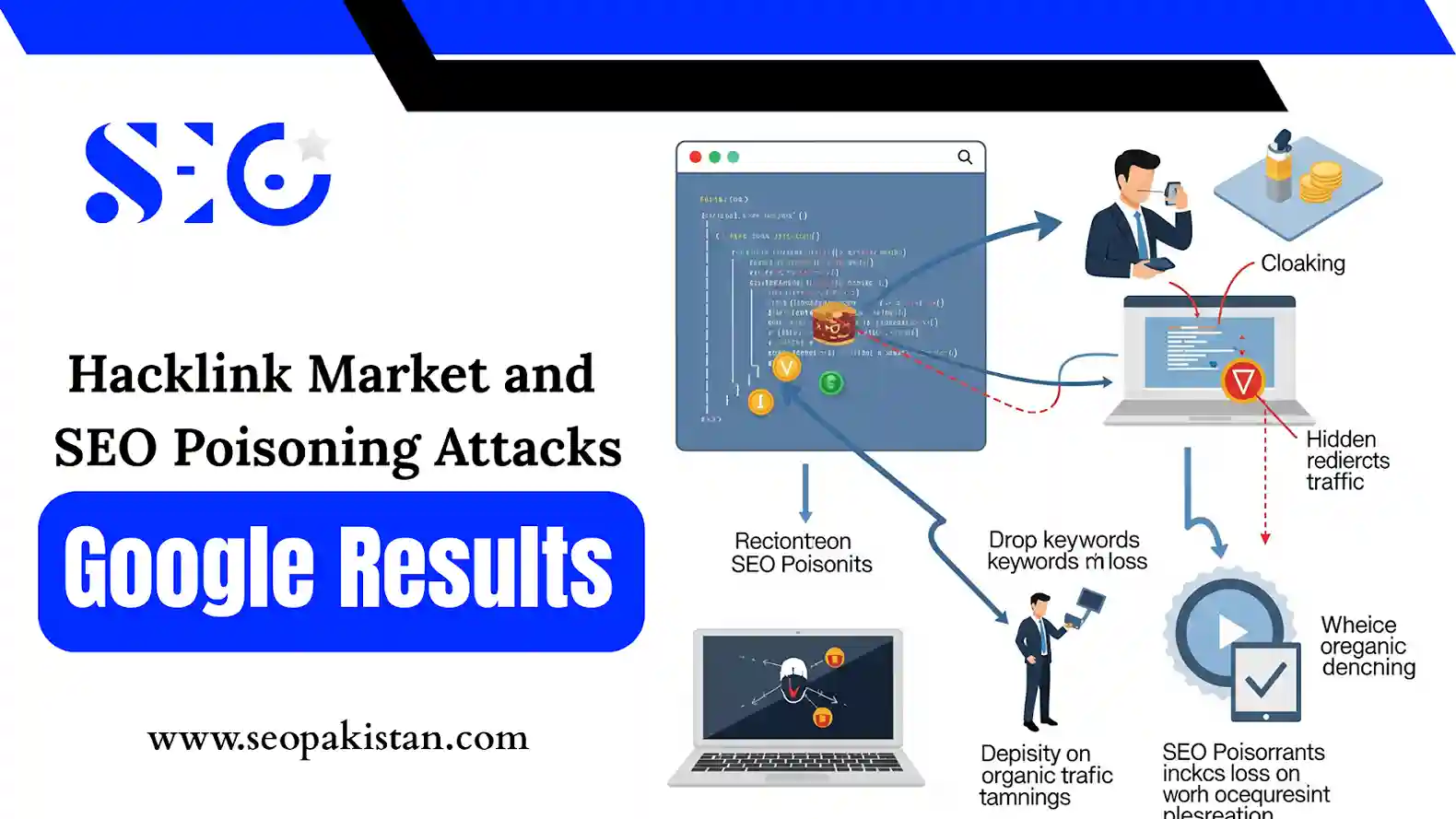Syed Abul here! As someone passionate about cybersecurity, I want to highlight an emerging danger: SEO poisoning attacks. These attacks are rapidly becoming a global concern, and Pakistan is no exception.
This malicious practice infiltrates search engine rankings by exploiting hacked websites, misdirecting users to harmful content, phishing pages, or even malware. Here’s a breakdown of the issue and practical guidance for businesses and webmasters.
How SEO Poisoning Attacks Operate
Hacklink, a black-market platform, plays a central role in these attacks. Using compromised websites, it injects invisible links targeting specific keywords, particularly in gambling, pharmaceuticals, and adult content sectors. These injected links manipulate Google’s algorithms to elevate the visibility of malicious sites, often outranking legitimate businesses.
The attackers leverage the authority of hijacked domains, particularly those with high credibility like .gov, .edu, or country-specific domains. While users see nothing suspicious, search engines index these fraudulent links, boosting scam sites’ rankings. This has far-reaching consequences, from disrupting brand reputations to putting user data at risk.
Hacklink: SEO Fraud as a Service
Hacklink operates as an online marketplace catering to scammers. Cybercriminals can browse through a selection of compromised domains, choose specific keywords and target URLs, and pay to have their content discreetly added to these sites.
As highlighted in a recent Netcraft report shared with Hackread.com, the costs vary, with basic listings starting as low as $1, while high-value domains command higher prices. A user-friendly web-based control panel enables even those with limited technical skills to easily manipulate search rankings on a large scale, provided they have the funds and harmful intent.
Often, the owners of these websites remain completely unaware of the breach. Their sites continue to appear normal and function as expected, all while unknowingly supporting fraudulent schemes. These compromised domains are used to promote fake products, redirect users to phishing sites, or distribute malware to unsuspecting visitors.
Cracking Down on Online Gambling in Turkey
Organizations such as “Neon SEO Academy” and “SEOLink” are reportedly providing services to manipulate search engine rankings for gambling-related terms. These groups assert control over a network of more than 15,000 breached websites, advertising their offerings on platforms like Telegram and WhatsApp.
But their tactics go beyond simple link injections. Certain groups gain access to the admin panels of insecure websites, allowing them to maintain control over an extended period and carry out deeper exploitation. Others use private blog networks to make malicious links appear more legitimate, blending aggressive SEO strategies with questionable practices.
Dynamic Ranking Adjustments
Researchers have discovered that attackers can manipulate how search results appear by altering anchor text within their link networks. This allows them to influence the way a compromised site is displayed in Google’s results without needing full control of the website.
In more advanced scenarios, this tactic can redirect search users to phishing pages or fake versions of legitimate websites. As a result, users may unknowingly enter sensitive information, such as passwords or payment details, into malicious traps.
Currently, online gambling sites are the most common targets, but this strategy could easily impact industries reliant on search engine visibility, such as banking, healthcare, cryptocurrency, and charitable organizations.
By exploiting user trust and damaging brand reputations, these attacks are not only hard to detect but also pose significant risks to both users and businesses.
Protecting Your Website from SEO Poisoning
For businesses and website owners, combating SEO poisoning requires immediate and proactive action. Follow these essential steps to protect your digital presence effectively:
- Secure Admin Panels: Use strong passwords, enable two-factor authentication, and limit admin access to a select few.
- Regular Website Audits: Continuously monitor for unauthorized changes, such as injected links or new, unknown files.
- Patch Vulnerabilities: Ensure your CMS, plugins, and extensions are updated to the latest versions to close security gaps.
- Disavow Toxic Links: Use Google’s Disavow Tool to report harmful inbound links and reduce their impact on your domain.
- Educate Your Team: Invest in security training for employees to identify potential phishing attempts or unauthorized access points.
If you’d like professional help, check out our Website Security Audit Service at SEO Pakistan. We specialize in detecting and resolving malicious activity to protect your online reputation and rankings.
A Competitive Edge Through Awareness
Despite its harmful nature, the issue of SEO poisoning offers an unexpected takeaway for forward-thinking businesses in Pakistan. By adopting best practices, investing in robust cybersecurity measures, and working with trusted partners like SEO Pakistan, you can outshine competitors inadequately prepared for such threats.
For more on maintaining a secure online presence, refer to this Google guide on safe search practices. Securing your website goes beyond preventing hacks or penalties; it’s about creating a foundation of trust that keeps your users coming back.
Stay safe, stay vigilant, and watch your digital growth soar. For tailored security solutions and expert consultancy, contact SEO Pakistan.













